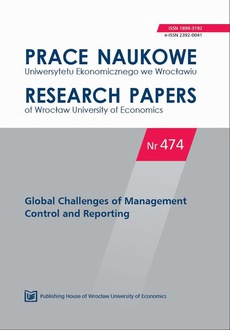POLECAMY

Prace Naukowe Uniwersytetu Ekonomicznego we Wrocławiu nr 474. Global Challenges of Management Control and Reporting
Autor:
Format:
ibuk
Globalisation of the economy causes an exposure of business entities to severe competition, changes in market rules and a continuous development of new technologies. In this situation it is important to increase effectiveness of business activities, keeping material, financial and human resources at their existing levels. In order to achieve their business goals, companies should implement the adopted action strategies and control their activities thoroughly. An improvement in business performance in various domains requires the use of adequate management instruments. Undoubtedly, management accounting and control provide such instruments which help to achieve objectives set by a company. Management accounting identifies information needs of managers, whereas management control contributes to the business control system. Both methodologies are related to a variety of managerial activities, including: planning support, budgeting, cost management, processes control and information flow management. This volume deals with problems of management accounting, control and reporting. The authors of particular papers discuss theoretical issues related to the foregoing concepts and their methods, as well as present examples how the aforementioned instruments are applied in various organisations. The volume is divided into four thematic sections. The first one elaborates on critical issues emerging in the area of control. The authors present problems and challenges of internal audit from multinational perspective, analyse relations between organizational attributes and the effectiveness of internal audit, and discuss soft aspects of auditors’ profession, including scepticism and moral attitudes. The second part addresses challenges of management accounting. In the debate the emphasis is put on a new concept, the business model, which gains importance in the context of how company design, deliver and capture value from its business activity. The authors also present strategic aspects of management accounting, including bancassurance models, building trademark value and reflecting the concept of Balanced Scorecard in Morgan’s organizational metaphors. The third section is dedicated to new perspectives of reporting practices. The authors focus on external reporting with its influential factors and strategies adopted, and in doing so they try to develop a framework for financial and non-financial disclosures. Moreover, a concept of impression management and its role in creating a desired image of an organization is introduced. It is also discussed how bibliometric analysis of scientific studies on Corporate Social Responsibility (CSR) may contribute to understanding that issue better. The last part deals with broadly understood financial and economic dimensions of a business. The authors emphasize a role of forecasting in a decision-making process, explore a nature and identify sources of cost-related risks, or link students’ enrolment choices in postgraduate programmes with their household budgets. The global problem of trading with illegal products, including medicaments, and its economic and social impacts is introduced, as well. We believe that this volume will contribute to the development and refinement of concepts and instruments of management accounting, control and reporting. It is important to increase their use in management of businesses and institutions.
Edward Nowak, Joanna Dyczkowska
| Rok wydania | 2017 |
|---|---|
| Liczba stron | 212 |
| Kategoria | Publikacje darmowe |
| Wydawca | Wydawnictwo Uniwersytetu Ekonomicznego we Wrocławiu |
| Numer wydania | 1 |
| Język publikacji | polski |
| Informacja o sprzedawcy | ePWN sp. z o.o. |
Ciekawe propozycje
Spis treści
| Introduction | 7 |
| Part 1 Critical issues of audit | 9 |
| Piotr Bednarek: The relationship between organisational attributes and internal audit effectiveness | 11 |
| Christian Brauweiler: Internal audit in a multinational perspective: Problems and challenges | 25 |
| Maciej Ciołek: Professional skepticism in auditing and its characteristics | 33 |
| Marta Nowak: Typology of ethical theories based on the criterion of moral judgement and their applicability in the auditor’s and accountant’s professions | 41 |
| Part 2 Challenges of management accounting | 51 |
| Wojciech Fliegner: Analysis of the business model elements and their relationships | 53 |
| Debora Lacs Sichel: The value of a trademark | 65 |
| Monika Łada, Małgorzata Białas: Financial settlements as a core of interorganizational management accounting – case study of bancassurance cooperation | 77 |
| Sylwia Łęgowik-Świącik: The application of the Altman Z-Score in the assessment of the business model of the company | 85 |
| Igor Perechuda, Gabriel Pawlak: Financial and business information of sport clubs determined by business model | 95 |
| Michał Pietrzak: Balanced Scorecard and Morgan’s organizational metaphors | 106 |
| Part 3 New perspectives of reporting practices | 115 |
| Joanna Dyczkowska: Drivers of strategy and R&D disclosures | 117 |
| Tomasz Dyczkowski: Strategies toward Internet disclosures in public benefit organisations | 133 |
| Elżbieta Jaworska, Grzegorz Bucior: Self-presentation Enterprise impression management as part of external reporting | 150 |
| Hanna Sikacz: CSR reporting as an object of bibliometric analysis of scientific publications | 160 |
| Part 4 Financial and economic dimensions of business activity | 171 |
| Magdalena Barańska: Impact of the student’s household budget on the selection of a given major at post-graduate studies | 173 |
| Bartłomiej Nita, Piotr Oleksyk: Role of forecasting support in decision-making process The case of debt to equity conversion | 185 |
| Edward Nowak: Costs as an economic category exposed to risk | 195 |
| Ricardo Luiz Sichel: Counterfeited drugs – the economic impact | 203 |
























